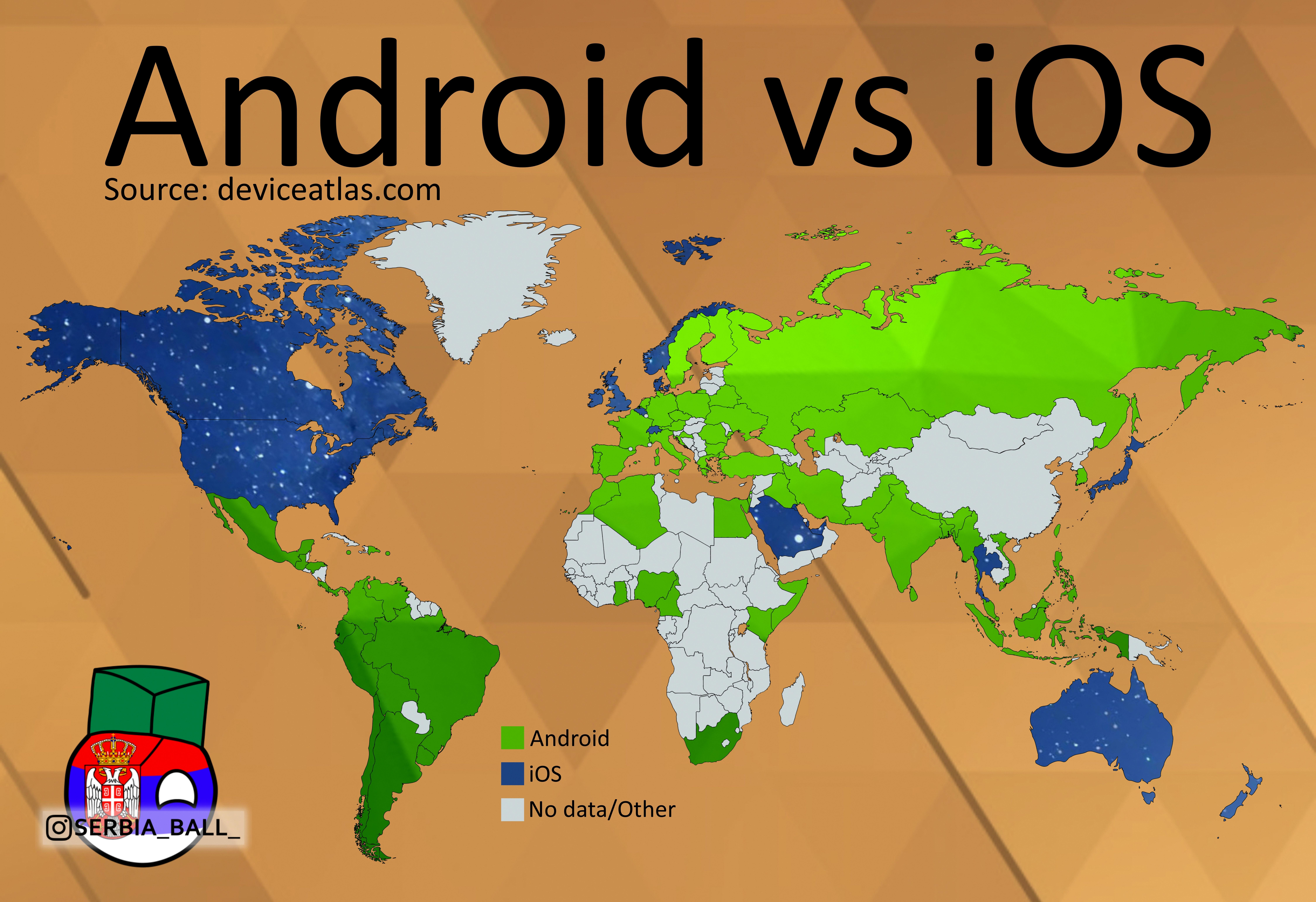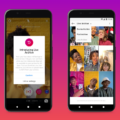In the ever-evolving world of smartphones, two giants have consistently dominated the market: iPhone and Android. These two platforms have become household names, with their own dedicated fan bases and unique features. But which one is more popular? Let’s delve into the statistics and explore the ongoing battle between iPhone and Android.
In the United States, iPhone has been the reigning champion for quite some time. Currently, it holds an impressive 57.93% market share, while Android trails behind with a 41.64% market share. This trend has been consistent since at least 2009, firmly establishing iPhone as the preferred choice for many Americans.
However, it’s worth noting that Android did come close to dethroning iPhone in 2011. During this period, Android gained traction by attracting a significant number of former Blackberry users. This surge in popularity showcased the potential strength of the Android platform and its ability to challenge iPhone’s dominance.
Zooming out to the global market, Android emerges as the clear victor. According to data from Statista, Android boasts an impressive 70.8% market share worldwide in 2023, compared to Apple’s 28.4%. This global outlook further solidifies Android’s position as the dominant smartphone platform.
Nevertheless, in the US specifically, Apple continues to hold its ground. In the first quarter of 2023, Apple claimed 52% of the local smartphone market, with Samsung trailing behind at 27%. This demonstrates the strong presence and popularity of iPhones among American consumers.
One factor that contributes to Apple’s success is the longevity of their devices. iPhones tend to last for over four years, and sometimes even longer if they are well-maintained. With Apple supporting iOS updates for five to six years, iPhones remain current for a longer period compared to Android phones. This aspect appeals to consumers who value longevity and staying up-to-date with the latest software.
The battle between iPhone and Android continues to rage on, but the scales tip in different directions depending on the geographical location. While iPhone dominates the US market with its 57.93% market share, Android reigns supreme globally with a commanding 70.8% market share. Both platforms have their strengths, with iPhone offering longevity and consistent updates, while Android provides a wider range of device options and customization. Ultimately, the popularity of iPhone or Android boils down to personal preference and individual needs.
Is IPhone More Popular Than Android?
In the US market, the iPhone holds a greater market share compared to Android devices. Specifically, the iPhone has a market share of 57.93%, while Android devices have a market share of 41.64%. This indicates that a majority of smartphone users in the US prefer iPhones over Android devices.
It is important to note that the iPhone has been leading the US smartphone market since at least 2009, indicating its sustained popularity over the years. Android, on the other hand, has not been able to surpass the iPhone’s market dominance, although it did come close in 2011.
During that time, Android was able to capture a significant portion of former Blackberry users, which boosted its market share. However, it was still unable to surpass the iPhone’s popularity overall. Since then, the iPhone has maintained its position as the preferred choice among smartphone users in the US.
The iPhone’s popularity in the US can be attributed to various factors such as its sleek design, user-friendly interface, seamless integration with other Apple products, strong brand reputation, and a wide range of available apps and features. However, it is important to note that Android still maintains a significant market share and has its own set of advantages, such as device variety and customization options.
In summary:
– In the US, the iPhone holds a market share of 57.93%, while Android devices have a market share of 41.64%.
– The iPhone has been leading the US smartphone market since at least 2009.
– Android came close to surpassing the iPhone’s popularity in 2011, capturing a significant number of former Blackberry users.
– The iPhone’s popularity can be attributed to factors like its design, user-friendly interface, integration with Apple products, brand reputation, and app availability.
– Android still maintains a significant market share and offers device variety and customization options.

Which Is Best Android Or IPhone?
When comparing Android and iPhone, it’s important to consider various factors before determining which one is best for you. Here are some key points to consider:
1. Customization: Android offers a high level of customization, allowing users to personalize their devices with different launchers, widgets, and themes. On the other hand, iPhone has a more uniform and consistent user interface, limiting customization options.
2. App availability: Both Android and iPhone have a vast array of apps available in their respective app stores. However, some apps may be exclusive to one platform or may be released earlier on one platform over the other. It’s advisable to check if the apps you need are available on your preferred platform.
3. Hardware variety: Android devices are manufactured by various companies, resulting in a wide range of choices in terms of design, features, and price points. iPhone, on the other hand, is limited to a few models released by Apple, offering a more streamlined hardware experience.
4. User interface: Android and iPhone have distinct user interfaces. Android typically provides more flexibility in terms of navigation and customization, while iPhone offers a more intuitive and user-friendly interface.
5. Integration with other devices: If you already own other Apple devices like MacBooks or iPads, you may find iPhone more convenient due to its seamless integration with these devices through services like iCloud and AirDrop. Android devices can also integrate with other platforms, but the experience may not be as seamless.
6. Security: Both Android and iPhone have implemented measures to ensure device security. However, iPhone is often considered more secure due to its closed ecosystem and stricter app review process. Android’s open-source nature makes it more susceptible to malware, but with proper precautions and app selection, it can still be secure.
7. Price range: Android offers a wider range of devices at various price points, catering to different budgets. iPhones, on the other hand, tend to be more expensive, especially the latest models. Consider your budget and desired features when making a decision.
Ultimately, the best choice between Android and iPhone depends on your individual preferences, needs, and budget. Consider the factors mentioned above and prioritize what matters most to you in a smartphone.
What Is More Popular IPhone Or Samsung?
In terms of popularity, Apple’s iPhone and Samsung’s Galaxy lineup are both incredibly popular and widely recognized brands in the smartphone industry. However, when it comes to the US market, Apple’s iPhone holds a stronger position in terms of popularity and market share.
According to the latest data from the first quarter of 2023, Apple’s iPhone claimed a dominant 52% of the US smartphone market. This indicates that more than half of the smartphones sold in the US during that period were iPhones. On the other hand, Samsung secured the second position with a respectable 27% market share.
It’s important to note that these figures reflect the popularity of the brands in the US specifically. Apple’s strong foothold in the market can be attributed to several factors, including its loyal customer base, brand reputation, and the popularity of its iOS operating system.
Samsung, however, remains a significant player in the US market, with a substantial market share. The brand has a wide range of Galaxy smartphones that cater to different price points and consumer preferences. Samsung’s popularity is driven by factors such as its innovative features, Android operating system, and its ability to compete with Apple in terms of design and performance.
While Apple’s iPhone holds a stronger position in the US, it’s worth noting that Samsung remains a formidable competitor globally. Samsung’s Galaxy lineup has gained immense popularity worldwide, particularly in countries where Android devices have a larger market share.
While both iPhone and Samsung smartphones are popular, Apple’s iPhone currently holds a more dominant position in the US market with a 52% market share, compared to Samsung’s 27%. However, Samsung continues to be a strong contender and remains popular both in the US and globally.
Do IPhones Last Longer Than Androids?
IPhones generally tend to last longer than Android phones. There are a few reasons for this:
1. Software Support: Apple provides software updates for their iPhones for a longer period compared to most Android manufacturers. Typically, Apple supports iOS updates for five to six years, which means that even older iPhones can still receive the latest features and security patches. In contrast, Android phones usually receive updates for a shorter period, often around two to three years.
2. Build Quality: iPhones are known for their high-quality build and durable construction. Apple pays attention to the materials used and the overall design of their devices, resulting in a more robust and long-lasting product. Android phones, on the other hand, come in various brands and models, so the build quality can vary significantly depending on the manufacturer.
3. Resale Value: iPhones generally have a higher resale value compared to Android phones. This indicates that iPhones retain their value over time, suggesting that they are still functional and desirable even after several years of use. Android phones, on the other hand, tend to depreciate faster in value.
4. Longevity of Performance: iPhones have been known to maintain their performance over time, even with regular use. Apple optimizes both the hardware and software to work seamlessly together, resulting in a smoother and more efficient user experience. Android phones, due to the fragmented nature of the operating system and the wide range of hardware configurations, may experience performance degradation over time.
It’s important to note that individual experiences may vary, and there are some Android phones that can also last a long time. However, overall, iPhones have a reputation for lasting longer and staying current with software updates for a longer period.
Conclusion
When it comes to market share, iPhone has consistently dominated the US smartphone market, holding a majority stake since at least 2009. However, globally, Android has emerged as the dominant platform, capturing a significant 70.8% market share in 2023 compared to Apple’s 28.4%.
In terms of durability, iPhones have proven to last over four years, and even longer with proper care. This can be attributed to Apple’s support for iOS updates for up to five to six years, ensuring that iPhones remain current and functional for a longer period compared to Android phones.
Both Apple’s iPhone and Samsung’s Galaxy lineup are powerhouses in the smartphone industry, with Apple currently holding a 52% market share in the US, followed by Samsung with 27%.
Ultimately, the choice between iPhone and Android comes down to personal preference and specific needs. While iPhone offers a seamless and integrated user experience, Android provides a wider range of device options and customization. It’s important for consumers to consider factors such as design, features, ecosystem compatibility, and long-term support when making their decision.








